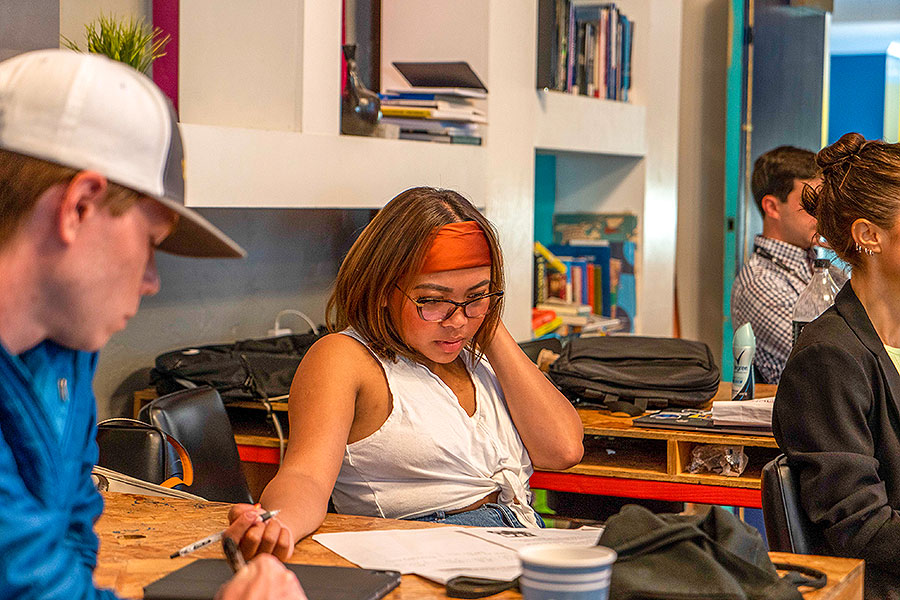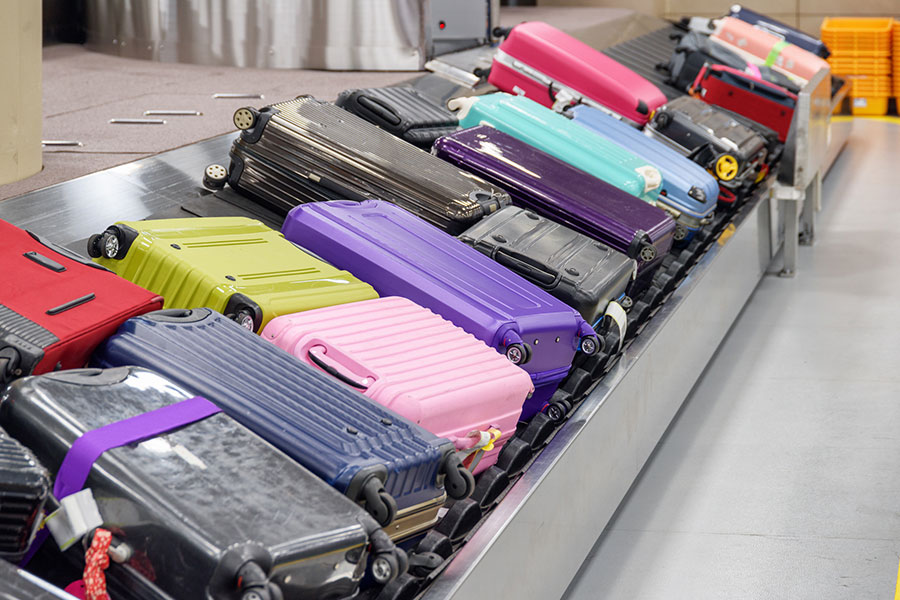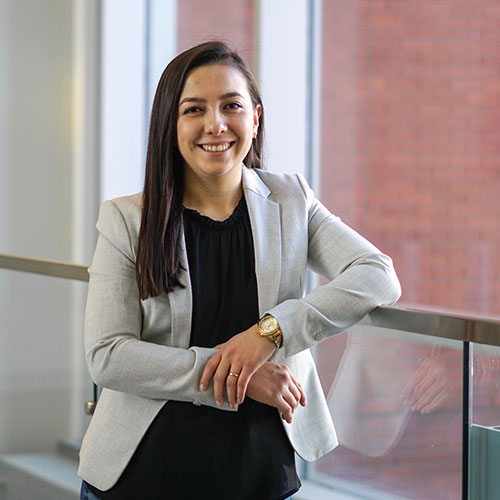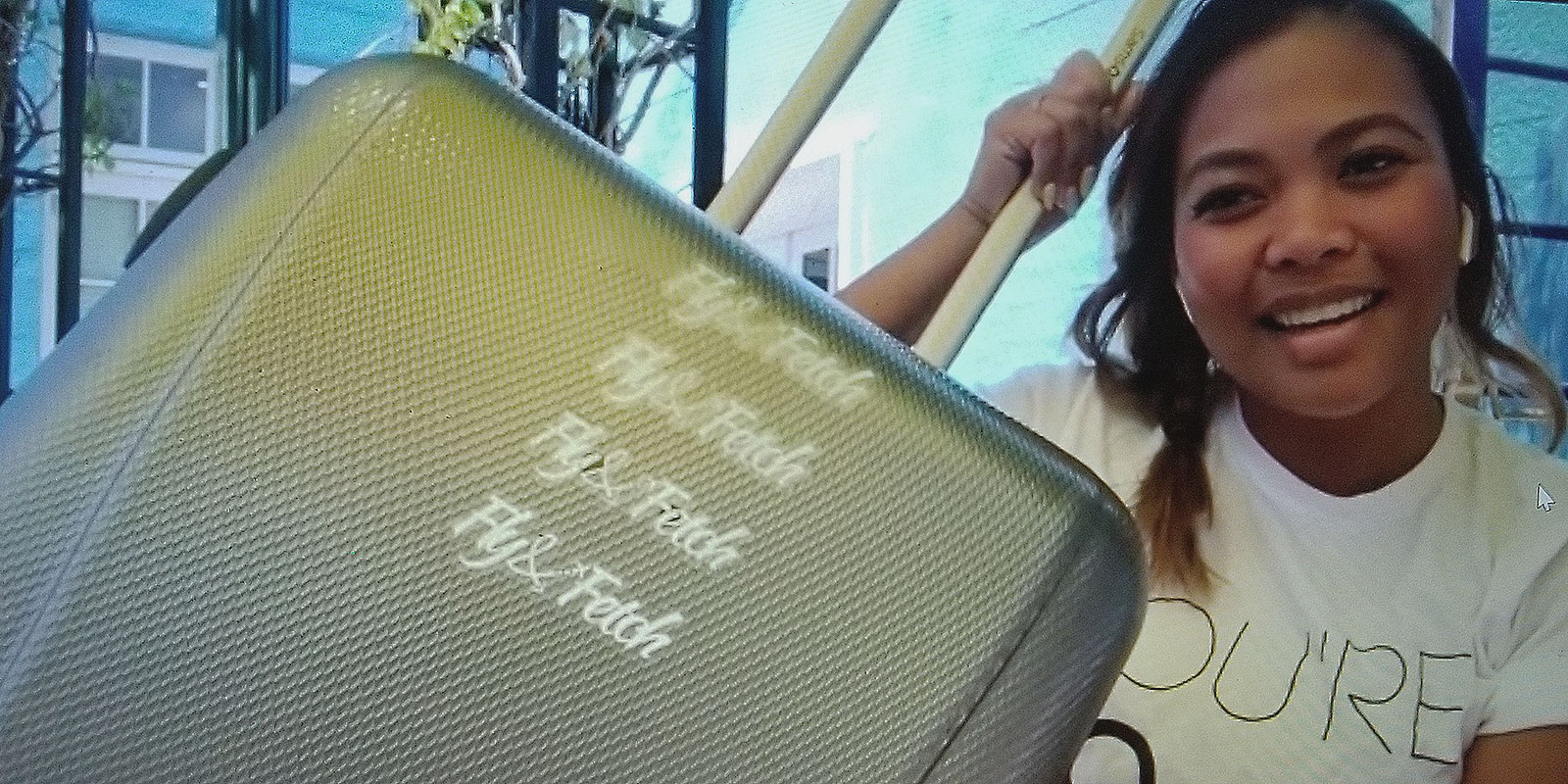Grad entrepreneurs aspire to great heights with shipping startup
Shelvie Fernan looks like she truly has it made in the shade. It’s a sunny summer day and the young entrepreneur sits beneath a broad patio umbrella. There’s a pool close enough that she could break its turquoise surface by dipping a toe into it.
She doesn’t, though. None of the other people chatting nearby do either. Fernan (Marketing ’16, Bachelor of Business Administration ’18), after all, is at school, finishing a five-week course at Draper University in downtown San Mateo, California. It’s a coveted education destination (the pool adding to its alluring Silicon Valley vibe) for promising entrepreneurs. She ended up there through a series of connections catalyzed by NAIT’s Mawji Centre for New Venture and Student Entrepreneurship.
Despite the casual setting, Fernan is all business. Her bright, genuine smile clearly conveys her confidence. And she speaks with a quick, economic cadence that one could imagine her using at Demo Day, the day before, when Draper students wrapped up their program by pitching to 150 tech-savvy investors for feedback and funding.
On this August day, she’s still in marketing mode for her company, Fly and Fetch. Fernan’s white T-shirt is emblazoned with bold, black letters: “YOU’RE SO FETCH.” Less subtle is the massive grey suitcase beside her, labelled four times with the company name.
But why be subtle? At 27 years old, Fernan may be en route to becoming the next big shared-economy disruptor. That suitcase is key – every cubic inch has the potential for profit.
The Fly and Fetch concept is simple, akin to using other people’s vehicles to upset the personal transportation business, or their homes to undermine the hospitality industry. Fernan, with two business partners, is targeting international shipping.
Sending a package across borders and oceans isn’t cheap. But having someone take it along in a suitcase that’s owned by Fly and Fetch is. The trick is to find enough senders to fill that suitcase. Oh – and to operate within laws designed to prevent, well, contraband smuggling.
Still, Fernan’s future could be as sunny and bright as her poolside present. She did, in fact, make a splash at Demo Day, piquing the interest of at least one investor, and her company is poised to benefit from resumed air travel following a pandemic-imposed hiatus. Fly and Fetch is ready for take off. But will it soar to great heights?
A born entrepreneur

In a way, Fly and Fetch started with an idea about earrings – and the suggestion that the idea was flawed.
In 2018, Fernan (pictured above) met Victoria Celi in class at the JR Shaw School of Business. Celi was impressed by her passion for business. “She couldn’t wait to be an entrepreneur,” she recalls of Fernan.
That eagerness had led Fernan to reassess her goals after getting an education in engineering in the Philippines. Soon after coming to Canada in 2013, she enrolled at NAIT to pursue a calling.
“I'm naturally an entrepreneur,” she says. “Ever since I was young, I've always been trying to sell things because it’s fun, not because I want to make money. I just love the transaction.
"I've always been trying to sell things because it’s fun, not because I want to make money."
“I remember going to my first marketing class at NAIT and I said, ‘This is where I belong.’”
The earrings came up over coffee between the two friends. Fernan had graduated and was working with a tech recruitment firm. Motivated by her interest in fashion, she told Celi she was planning to import jewelry from the Philippines to sell. Shipping costs, countered Celi, would squeeze margins. But Fernan could use her connections to find a traveller to bring them for a small fee.
“I think that was her ‘a-ha’ moment,” says Celi.
With that, they started hatching what would become Fly and Fetch, incorporated just a few months later, in November 2019.
It did not emerge fully fledged from that process. At first, it was a marketplace. Travellers would sign up to be contacted by customers needing couriers.
But “it wasn’t growing as fast as we wanted,” says Fernan. “It seemed like there were a lot of problems.”
No matter. They’d all be trumped by the pandemic, which removed travellers from the equation, effectively breaking a passive business model.
In retrospect, that may have been just what Fly and Fetch needed.
Love the problem

There can be trouble with startup entrepreneurs, suggests Cecile Wendlandt, coordinator of the Mawji Centre, where Fernan and Celi have competed in student pitch competitions. “They tend to fall in love with their solution.”
Instead, she says, you need to love the problem. Once the pandemic hit, that’s all that Fernan and Celi were left with. So they embraced it.
“Of course we were worried about the future of the business,” says Celi (pictured below). If they felt they had the matter in hand, it was largely because of Fernan’s positive attitude, she adds.
 “I’ve told her, ‘Sometimes I just need you to tell me everything is going to be fine, and I know it will be fine.”
“I’ve told her, ‘Sometimes I just need you to tell me everything is going to be fine, and I know it will be fine.”
Fernan was unfazed by the prospect of rework. “It didn’t really bother me that much,” she says. “I just think it made me stronger.”
To her, the pandemic was a master class in problem solving. “I thought it was fun.”
Over the summer of 2020, with the help of chief technology officer and partner Shane Brass, Fly and Fetch rebuilt its platform around a radically new concept. Rather than create a place for travellers and senders to connect, they would create space for packages to be sent.
“The deal is we just make sure we own their luggage space,” says Fernan. That is, a traveller’s checked-bag capacity belongs to Fly and Fetch, which then charges senders to use it. This is coordinated by a hub manager, who gathers and checks the contents and preps them for shipping with the traveller (who checks things again for safety’s sake).
“The deal is we just make sure we own their luggage space.”
The result is a healthy profit margin. While Fernan didn’t want to share how healthy, it’s enough for Fly and Fetch to entice travellers by paying their airfare.
For customers, says Fernan, the benefit is shipping that’s roughly 80% cheaper and about twice as fast compared to conventional international shippers.
“Everyone just loves it,” she says. The love bolsters her confidence. “I envision for us to be the next Uber or Airbnb, but for international shipping. I have something that could grow that big.”
Ready for take off

Zack Storms appreciates the loftiness of that goal. In 2019, he founded Startup TNT, an Edmonton-based not-for-profit that fosters local entrepreneurial efforts and nurtures the new-venture community.
It also holds semiannual investment summits, where nascent companies can pitch to potential funders. Fernan and Celi presented, unsuccessfully, at the very first event. But they caught Storms’ attention.
“They've pivoted slightly,” he says. “It’s really more of just a refinement of the business model.” But it’s enough, he adds, that “when the travel industry opens up … I can imagine the company really taking off.”
The new, free-flight model is more obviously appealing to travellers, he points out, which are the company’s revenue linchpin. The branding (recall Fernan’s efforts with T-shirts and suitcase) strikes him as strong, too. And he feels that Fernan and Celi understand their market.
Storms doesn’t see them as being in competition with the multinational shipping behemoths. Fly and Fetch relaunched mainly by serving the Philippine and other similarly diasporic markets.
“They’re serving an unserviced market in a way,” says Storms. “I think with a lot of her customers the alternative is not to ship. It’s way too expensive.”
“When the travel industry opens up … I can imagine the company really taking off.”
But issues remain to be addressed, he adds. How much cargo can you get on a flight? Will airlines get wise and push back? Can revenue be predictably generated? Should hub managers, who are contractors rather than employees, be trusted with the company’s reputation?
 And then there’s the big one: Funders have continued to raise questions about travel laws and safety.
And then there’s the big one: Funders have continued to raise questions about travel laws and safety.
“It’s definitely the first question every investor asks,” says Storms. “Whenever [Fly and Fetch] pitch now, they point out the fact that it’s legal in, like, slide number two.”
But on the whole, “it feels like there’s a real opportunity here,” says Storms.
“So I think those are all, at this point, details that can be refined.”
Wendlandt, from the Mawji Centre, agrees. As for nimbleness, Fly and Fetch has already proven itself to be more fighter jet than airliner.
“One of the things you’ll hear people say in entrepreneur circles is ‘fail fast,’” she says. “Make mistakes quickly, learn from them and move on. That’s what these women are not afraid to do.
“And they’re also not afraid to ask for help.”
A universal need

By November 2021, Fernan and Celi find themselves awash in help, mostly in the form of cash. Fernan’s potential investor came through following Demo Day at Draper, and she left with US$50,000 and an offer of free office space and lodging in San Mateo. They put the money toward buying more flight tickets, marketing and website improvements.
“We’ve delivered thousands of pounds of capacity in five different countries already," says Fernan. "Sales went from $5,000 one month to more than $16,000 the next."
Another deal came from a connection made through Startup TNT, at an investor summit in Calgary. Fernan wasn’t pitching, just mingling, when she was approached by Alex Wilkenson, a partner at ZeroDay Fund, a local venture capital group.
He’d heard of Fly and Fetch and invited her to meet with his partners the next day at a noisy pub on 17 Ave, the city’s main entertainment district. A Flames game played on the TVs.
“It was pretty chill,” says Fernan.
At the time, she and Celi had begun fundraising for $200,000. Wilkenson's partner, ZeroDay managing director Azmain Abrer, wrote an offer on an actual napkin and slid it across the table. It was for the full amount.
"ZeroDay will invest in resourceful people who need that first serious investment to move from proof of concept to startup company,” says Abrer. “Fly and Fetch is a great example of people who embody this kind of do-better entrepreneurial spirit Alberta was built on."
The money will clear the runway of a major obstacle, addressing the security issue in a way that will lift the company’s credibility. So far, safety checks have been meticulous but manual. With ZeroDay’s investment, which gives them a small amount of future equity in the company, Fly and Fetch will install X-ray scanners in hubs in Edmonton, Manila, a yet-to-be-determined U.S. location, and in the new market of Karachi, Pakistan.
Abrer wrote an offer on an actual napkin and slid it across the table.
It’s $20,000 to $30,000 per machine, says Fernan. It’s an investment she feels will pay off not just in higher security, but by quelling future investors’ concerns and giving customers peace of mind. “It’s basically easier for us to grow in the future, and it’s a good competitive advantage.”
This is a big step toward Fernan’s goal of creating something big. She’s refining the business by working with more familiar markets, but she sees the need that Fly and Fetch is meeting as universal. The prevailing culture of instant gratification is cheap and fast – her company’s MO.
“Amazon has this thing where they can ship it the next day,” she says. “We can do it for you, but internationally.”
That is to say, Fernan believes that Fly and Fetch can do what a $1.8-trillion corporation cannot or will not. She believes in her ability to disrupt not just the international shipping industry, but one of the world’s biggest disruptors. This might be why someone pushed a $200,000 napkin across a table to her.
“I think most investors focus on the founders,” says Fernan. “They focus on if this person is gritty enough, if this person is a problem solver.
“The problem that we're solving is very big and very real,” she adds. “And I’m here to make sure that it gets solved.”
